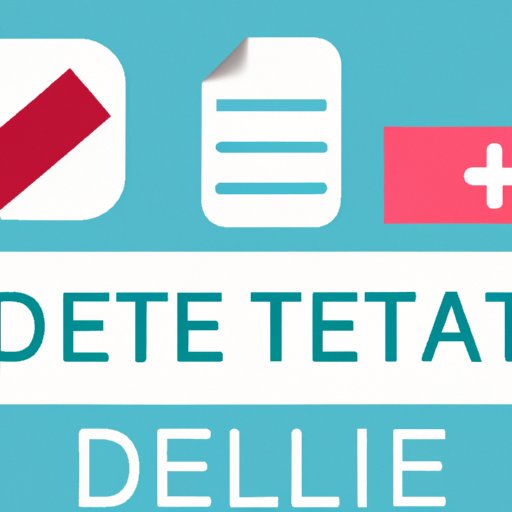Introduction
Twitter can be a fun and informative social media platform, but it’s not for everyone. Perhaps you’ve decided to take a break from social media, or you don’t want to be part of the Twitterverse anymore. Whatever your reason, deleting a Twitter account can be a daunting task. That’s why we’re here to provide a comprehensive guide on how to delete a Twitter account. We’ll also explore the advantages, disadvantages, and alternatives to deleting Twitter, as well as offer tips and resources for addressing common issues related to Twitter use.
Step-by-Step Guide on Deleting a Twitter Account
Deleting a Twitter account isn’t as straightforward as you might think. Here’s a step-by-step guide to help you through the process:
1. Log in to your Twitter account.
2. Click on the three dots on the left-hand side of the screen and select “Settings and privacy.”
3. Scroll down to the “Your account” section and click on “Deactivate your account.”
4. Read through the information provided by Twitter, then click on “Deactivate.”
5. Enter your password when prompted, then click on “Deactivate account.”
It’s important to note that your account won’t be deleted immediately. Twitter will keep your data for 30 days in case you change your mind. If you don’t log back in within 30 days, your account will be permanently deleted.
Advantages and Disadvantages of Deleting a Twitter Account
Like any social media platform, Twitter has its pros and cons. Here are some advantages and disadvantages of deleting a Twitter account:
Advantages:
– Increased privacy: By deleting your Twitter account, you won’t have to worry about your tweets, likes, or personal information being publicly accessible.
– Less social media pressure: Twitter can be a stressful place, with constant updates and opinions being shared. By deleting your account, you can remove the pressure of keeping up with the latest tweets.
– More time for other activities: Twitter can be a time-suck. By deleting your account, you can free up time for other activities.
Disadvantages:
– Losing connections: If you’ve made friends or networking connections through Twitter, deleting your account could mean losing those connections.
– Inability to share/view certain information: Twitter can be a valuable source of information, and by deleting your account, you won’t have access to tweets, articles, or conversations you might otherwise find useful.
Alternatives to Deleting a Twitter Account
If you’re not ready to delete your Twitter account, there are alternatives to reduce its negative impact. Here are a few suggestions:
– Mute accounts that tweet content you don’t want to see.
– Unfollow accounts that you don’t find valuable.
– Take breaks from Twitter on a regular basis.
– Use other social media platforms that are less stressful than Twitter, such as Instagram, Tumblr, or LinkedIn.
Common Reasons Why People Delete Twitter and How to Deal with Those Issues
People delete their Twitter accounts for various reasons. Here are some common reasons and how to address them:
Harassment: If you’re being harassed on Twitter, you can report the user and block them from accessing your account. Twitter has strict policies against harassment and takes reports seriously.
Addiction: If you find yourself using Twitter more than you’d like, consider deleting the app from your phone or logging out of your account when not in use. If you’re struggling with addiction to social media in general, seek professional help.
Political reasons: If Twitter is adding more stress to your life due to political negativity, UN-following news accounts and creating a curated list for those accounts you prefer to follow can be helpful.
Exploring the Impact of Deleting a Twitter Account on Mental Health
Studies have found that there is a link between social media use and mental health issues such as anxiety and depression. Deleting a Twitter account can potentially improve one’s mental health, as it removes a source of stress and pressure. It is important to identify moderate usage with a healthy balance of personal and public life. Striking balance between these two aspects will have a positive impact on mental heath.
How to Back up Your Twitter Data Before Deleting the Account
If you’ve decided to delete your Twitter account, you might want to back up your data first. Here’s how:
1. Log in to your Twitter account.
2. Click on the three dots on the left-hand side of the screen and select “Settings and privacy.”
3. Scroll down to the “Data and permissions” section and click on “Your Twitter data.”
4. Click on “Download your Twitter data.”
5. Review the information provided, then click on “Request data.”
Once your data is ready, Twitter will send you an email with a link to download your data. It’s important to note that Twitter will only store your data for a limited time, so make sure to download it as soon as possible.
Case Study about Someone Who Deleted Their Twitter Account and How It Affected Their Life Positively/Negatively
Many people have deleted their Twitter accounts for various reasons. One person who did so says, “Deleting my Twitter account has been really positive for my mental health. I no longer feel the pressure to keep up with everything, and I have more time for myself and activities I enjoy.”
Another person, however, says, “I regret deleting my Twitter account because I lost touch with some contacts who only used Twitter to communicate. I also miss some of the conversations and interesting information that was shared on the platform.”
This case study shows that there are both positive and negative consequences to deleting a Twitter account.
Conclusion
Deleting a Twitter account can be a big decision, but it can also be a positive one. We hope this comprehensive guide has helped you understand how to delete a Twitter account and the potential advantages and disadvantages of doing so. Remember, if you’re not ready to delete your Twitter account, there are alternatives to reducing its negative impact. Whatever you decide, make sure to prioritize your mental health and well-being.
